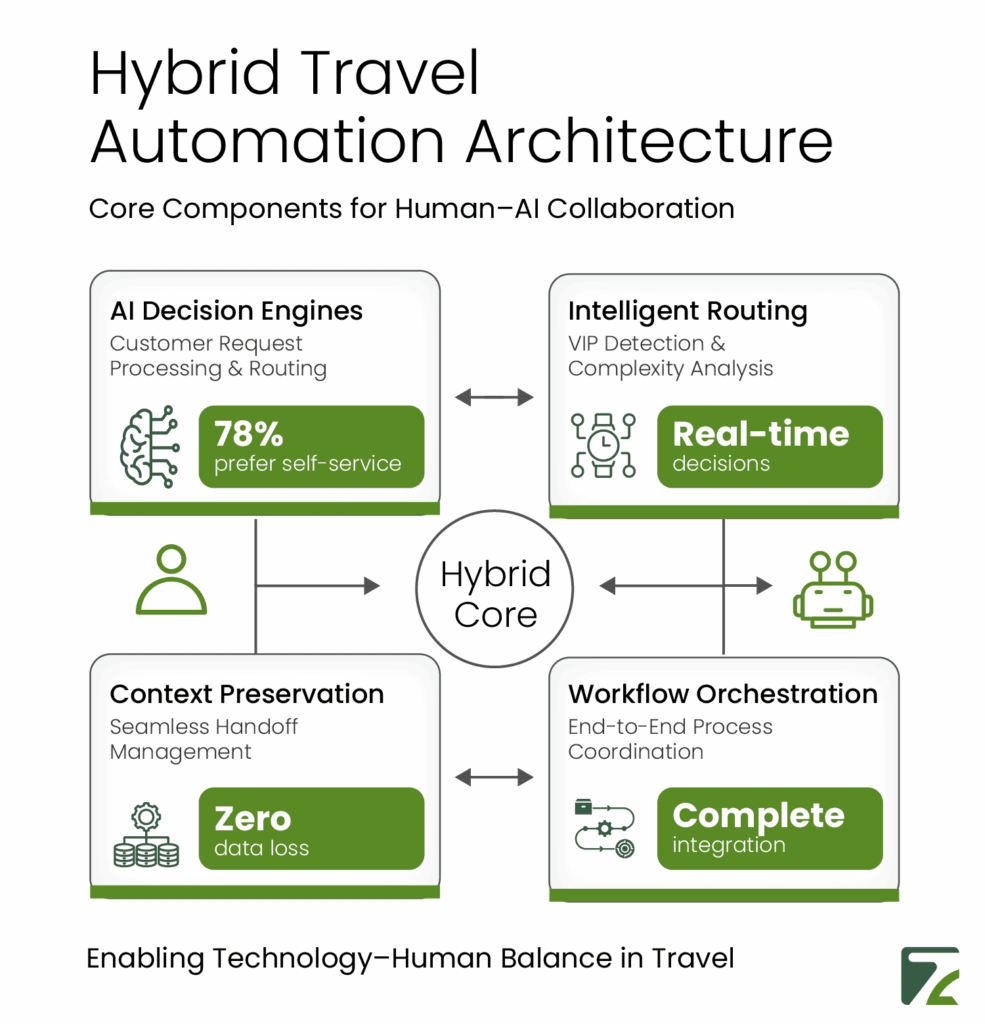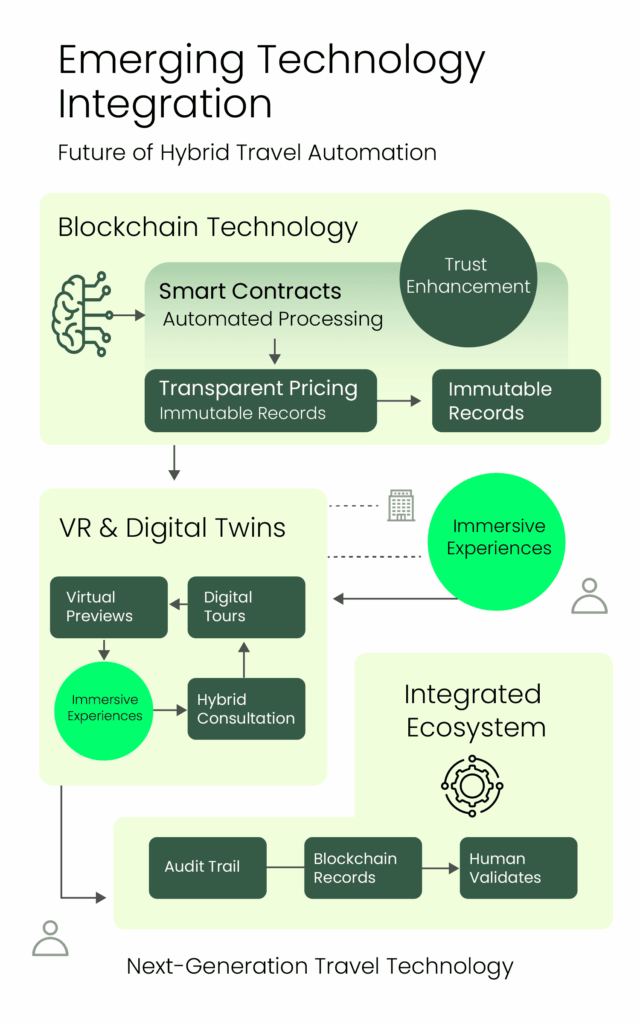The automation in travel industry is now much more refined and condensed, where artificial intelligence is effectively combined with human specialist. This hybrid automation in travel is the next generation automation in travel where it would be a symbiosis of semi-automated travel processes alongside operational efficiency and bespoke human touch in travel.
Rather than a wholesale substitution of human agents, the most advanced travel companies integrate human-AI hybrid travel systems that figure out what tech or humans to leverage in what situation. Whereas full automation entails absence of human involvement, balanced automation accepts that other use cases exist in which the role of technology can differ.

Advanced hybrid travel automation systems depend on multiple interplaying components to invite smooth Human-AI collaboration travel:
GBTA and Sabre research shows self-service is favored, as 78 percent of US business travelers use such technology solutions to manage trips, but convoluted scenarios are not completely stuck up in the machines. Which explains why hybridization requires the automatic convenience that travelers have a right to, and also the human touch that is often so crucial.
The technology can help travel companies stay consistently open for business, getting more out of the resources they allocate considering the complexity and value of the particular interaction. Carriers like Delta have a mechanism that leverages sophisticated routing to recognize automatically that you are not a business customer and move you to the right service channels.
The vast majority of the travel trade conversations regarding hybrid travel automation focus on enterprise roll out which provides little practical support to smaller travel agencies, boutique hotels or independent operators. Balanced automation can be achieved in small firms affordably, incrementally.
The early phase grants immediate efficiencies and leaves open the kind of personal touch that small businesses tend to have as an asset. And even small travel companies with little money to spend can see dramatically faster response times and happier customers without blowing open the vault for travel industry grade infrastructure.
The “trick” with making SME work is to ‘locate’ high throughput / low complexity tasks for the SME bot to automate along with having escalation paths for the human preserved but still transparent. (The desire is just to raise small business efficiency.)
It should be a crawl, walk, and run process small business owners are engaging in as they implement a simple iteration of an approach which quickly informs owners about ROI and customer feedback, so they can roll out the innovation to broader parts of their business.
Marriott International is showing that hybrid automation works they invested $1-1.2b in AI in 2024.” The company entered more than 150 uses cases on AI across three use cases: Accelerated Content Generation with Human Brand Oversight by AI for content creation by AI with human brand oversight; Elevated Customer Experience via RenAI Virtual Concierge for automated recommendation with human concierge to handled complex requests; and Augmented Intelligence that release employees from mundane tasks so that they could concentrate on guest relationships. It offers a vision of a large-scale automation that augments, rather than supplants, human expertise in hospitality.
Source: AIX | AI Expert Network – https://aiexpert.network/marriott-ai/ (July 8, 2024)
Establishing true trust in hybrid automated travel is more than just humanizing AI: it needs systematic transparency and accountability mechanisms. The best innovations are designed to build systems that the customer can comprehend, control and trust.
Implementing trust-building measures includes open communication of when customers are interacting with AI versus human involvement, choice design that enables customers to control their level of experience of automation and structured mechanisms to address errors or complaints stemming from the automated systems.
Privacy-first design principles are expressed as restriction of data collection to the minimum needed, using customers’ data only for the purpose of the service; and to make it easy for customer to access, edit or delete data. These ethical dilemmas are particularly relevant for travel companies, which are storing and/or using particularly personal data and making decisions which can have a large effect on a customer’s experience.
This is one of the largest holes in hybrid travel automation and what is missing is an analysis of what level of human engagement is most effective along side the automated systems and what kind is the return on investment for the level. Knowledge of these metrics is significance to the decision of the appropriate level of automation.
| Human Touch Investment | Measurable Return | ROI Timeline |
|---|---|---|
| Personal concierge for luxury bookings | 35% higher booking value + 60% repeat rate | 180% ROI within 12 months |
| Human escalation for complex itineraries | 25% faster resolution + 40% higher satisfaction | 145% ROI through retention |
| Expert consultation for group travel | 50% larger group sizes + 30% ancillary sales | 220% ROI per group booking |
| Crisis management human support | 90% customer retention during disruptions | 300% ROI in crisis situations |
The human value measurement model will need to track metrics like conversion rates and customer lifetime value, but also less tangible metrics like satisfaction scores and-if feasible-competitive differentiation assessments.
The move to hybrid travel automation is not merely putting people out of work; it is causing work to be reconfigured into roles that are more strategic and relationship-based. The skills set of travel professionals will have to be different, combining tech skills with improved human competencies.
Learning programs would need to encompass frequent AI training in the form of monthly trainings about new automation capabilities, customer psychology education to understand the way customers interact with hybrid systems, and tool proficiency by getting your hands dirty with CRM, analytics and communication platforms.

Innovative travel companies are combining advanced technologies with their hybrid travel automation solutions to build more intelligent and reliable solutions. This integration is the next step for balanced automation in travel.
The integration of human-AI blockchain leads to systems in which AI suggest actions, blockchain registers decisions, and humans govern complex situations. It provides an auditable trail of all automated and human decisions and gives the customer confidence that their data and bookings will be processed in accordance with policies.
AI in travel remains an industry that doesn’t yet have set-in-tone regulations, and AI acts as a lens under which the laws of each country must be interpreted and adapted. Knowledge of such requirements is key to the successful implementation of hybrid automation.
There need to be AI decision liability frameworks with clear responsibility assignment on when the company or the AI vendor is responsible for decisions, specialized insurance products for AI decision-making errors, and documented human oversight requirements for high-stakes decisions going forward.
Successful hybrid travel automation deployment is as much about technical deployment as it is about organizational change. Businesses must have clear markers and measurable results along the way on their automation journey.
Hybrid travel automation is the smarter answer to outdated travel technology, transcending the contradiction between efficient travel and personalized travel.The best semi-automated travel designs agree even more so: Today’s modern traveler demands the care of technology along with the security of humanity.
The trick with this kind of human-AI collaboration doesn’t lie in perfect automation, obviously, but intelligent orchestration knowing when to rely upon AI for speed and consistency, and when to call in humans for a bit of complex problem solving, relationship building, or creative thinking.Organizations achieving this type of balanced automation will be able to provide better customer experiences while realizing operational efficiency.
Key focal points for success in hybrid automation of travel include:
By breaking these components down and systematically addressing them, travel companies can automate task-oriented processes that supplement, rather than replace, human talent and provide both the efficiency that customers seek and the personal touch that they cherish. Those companies that are investing in strong hybrid capabilities today will be in the strongest position to deliver on consumer expectations tomorrow and retain the human connection that makes travel experiences truly special.
Hybrid automation in travel is a balanced approach that combines artificial intelligence (AI) and automated processes with the essential human touch of travel specialists. It aims for a symbiosis of efficiency and personalized service, leveraging technology for routine tasks while reserving human expertise for complex or high-value interactions.
While self-service solutions are popular for simple tasks, complex travel scenarios often require human intervention and empathy. Hybrid automation provides the convenience of automation for travelers alongside the crucial human touch for nuanced situations, leading to better customer satisfaction and operational efficiency.
SMEs can implement hybrid automation incrementally and affordably. Starting with chatbots for initial customer communication and appointment scheduling (Phase 1), then integrating simple booking flow intelligence (Phase 2), and finally incorporating deeper analytics and AI for complex inquiries (Phase 3). The key is to automate high-throughput, low-complexity tasks first and ensure clear escalation paths to human agents.
Ethical AI in travel requires transparency and accountability. Key considerations include data privacy (minimizing collection, ensuring consent), algorithmic transparency (explaining AI decisions), bias detection, and human oversight for critical decisions. Companies must also establish clear accountability frameworks and provide appeal mechanisms for customers.
Hybrid automation reconfigures human roles, shifting them from transactional tasks to more strategic and relationship-based functions. Travel professionals will need new skills, including AI literacy, data interpretation, system understanding, and enhanced human competencies like complex problem-solving, emotional intelligence, and consultancy. Roles evolve from "Travel Agent" to "Travel Experience Designer" and "Customer Service Rep" to "Customer Success Specialist."

Travel Automation Expert